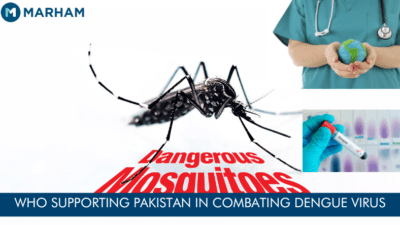The Government of Pakistan is receiving technical assistance from the WHO country office in Pakistan as it combats the Dengue Cases; a deadly fever epidemic.
Up to this point, the current pandemic has been responsible for 16,580 confirmed cases, 257 fatalities in Lahore, and over 5,000 cases and 60 reported fatalities across the rest of the nation.
WHO explaining about areas of dengue fever prevention as:
Vector control, case management, and community awareness are the three areas of prevention and control of dengue fever where WHO offers technical assistance, recommendations, and capacity-building for planning and implementation.
All three provinces affected by the epidemic—Khyber Pakhtunkhwa, Punjab, and Sindh—are receiving this support.
Dengue fever was initially detected in Pakistan in 1994, but it wasn’t until November 2005 in Karachi that there was a sharp increase in cases and the start of the annual epidemic trend.
Read Also: Dengue Fever – Signs and Symptoms of Dengue Fever
Since 2010, a dengue fever pandemic in Pakistan has resulted in 16,580 confirmed cases, 257 fatalities in Lahore, and almost 5,000 cases and 60 reported fatalities throughout the rest of the nation.
Khyber Pakhtunkhwa, Punjab, and Sindh are the three provinces affected by the disease. In order to address the outbreak, WHO is offering the government technological support.
This includes giving general guidance and developing capacity for the formulation and use of preventative and control actions.
Read Also: Which fruit is best for dengue fever
Vector control, case management, and community awareness are the three main focus areas.
WHO entomologists examined the Aedes mosquito in Karachi during the 2005 outbreak in order to help with vector management. The WHO used this data to create control interventions specific to Pakistan.
WHO declared that Plans have been made to put the suggested interventions into action, however the government has now to deal with the aftermath of Pakistan’s greatest floods in 2022, which resulted in population displacement.
In order to integrate dengue prevention and control within the malaria control program, WHO and the Federal Ministry of Health drafted a long-term plan.
Pakistan’s Federal Ministry of Health said that WHO is steadfastly devoted to enhancing Pakistani citizens’ health.
It will keep working to support Pakistan’s dengue response by offering scenario analyses, recommendations for interventions with a high degree of quality, and capacity building for health planners and providers at all levels and in all of Pakistan’s provinces.
Click here to see an Online Doctor for Dengue Treatment today via the Marham app.

